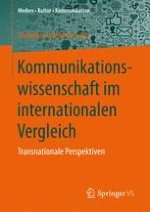2017 | OriginalPaper | Buchkapitel
Die Entwicklung der Kommunikationsforschung und -wissenschaft in Ägypten. Transnationale Zirkulationen im Kontext von Kolonialismus und Globalisierung
verfasst von : Carola Richter, Hanan Badr
Erschienen in: Kommunikationswissenschaft im internationalen Vergleich
Verlag: Springer Fachmedien Wiesbaden
Aktivieren Sie unsere intelligente Suche, um passende Fachinhalte oder Patente zu finden.
Wählen Sie Textabschnitte aus um mit Künstlicher Intelligenz passenden Patente zu finden. powered by
Markieren Sie Textabschnitte, um KI-gestützt weitere passende Inhalte zu finden. powered by
